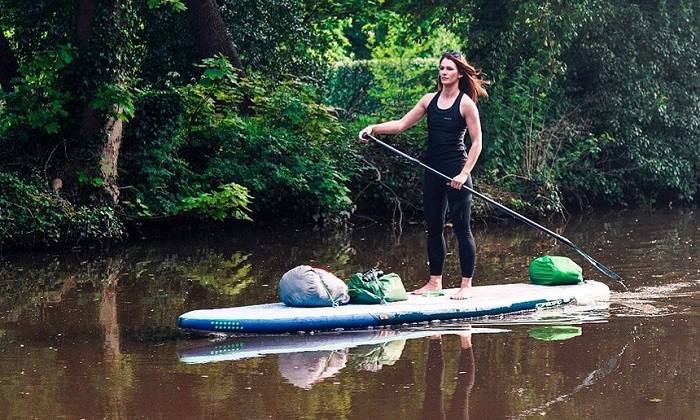Lizzie Carr completed the 22-day challenge on Sunday with swollen knuckles and more than 2,000 photos of plastic junk she found in canals and rivers from Godalming in Surrey to Kendal in Cumbria.
The 30-year old paddle boarder catalogued more than 1,600 plastic bottles, over 850 plastic bags, 40 footballs, 24 toys, seven dummies, a pair of traffic cones and one bin lid.
Carr said she was motivated to undertake the journey after being appalled at the amount of plastic she encountered while doing stand-up paddle boarding in Paddington basin, in London.
“I was getting plastic bags and whatever caught up in my fin ... it was just, like, this is ridiculous – you can’t even paddle along in the water without getting plastic caught to the paddle board in some way,” she said.
That experience prompted her to look into the way inland waterways contributed to the estimated 8bn tonnes of plastic dumped in the oceans each year.
“For me, it felt something needed to be done to raise awareness of the fact that our canals and rivers are choking with this stuff. There’s great attention globally on the oceans which is really important but 80% of that comes from inland sources.”
Carr found a big difference between more rural areas in Lancashire and Cumbria, which were relatively “clean and immaculate”, and cities where she found a high concentration of plastic debris, in particular plastic kids’ toys.
While her aim was not to clean up the rubbish directly but document it, she said she hoped the records would inspire local people to go out and help clean up their local hotspots.
People on the route were kind and generous, she said, and wanted to do something about the plastic dumped in their waterways. “It was something they felt affected them, but they didn’t know how to go about doing something about it.”
The stories you need to read, in one handy email
Read more
The physical demands of standing up and paddling for 12 hours a day in all weathers before stopping to camp and sleep caught up with her at the end.
“Physically I don’t think I realised how exhausted I was until I stopped, and sat down,” she said. “The joints in my hands, my knuckles, are really swollen, from gripping the paddle, and from the repetitive movement.”
The 193 locks on her route were the most exhausting part, with Carr having to portage – carry her board and 30kg of gear – around them and other obstacles.
Carr began paddle boarding around two years ago, after being diagnosed with cancer, which is now in remission. Her plastic expedition, which she described as “one of the best adventures I’ve had in my life”, has raised £400 so far for the charities WaterAid and WaterTrek, and was supported by the Ordnance Survey.
More about:
















































